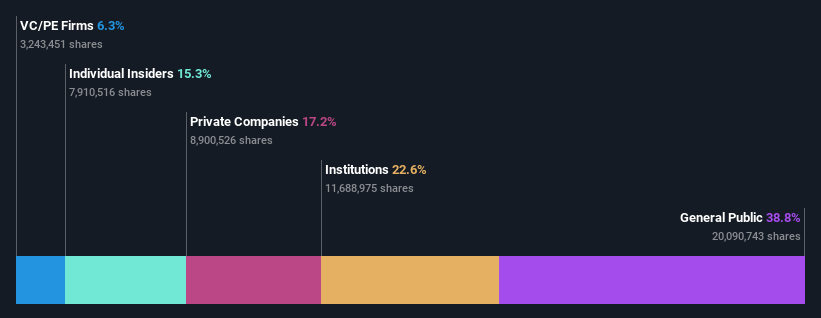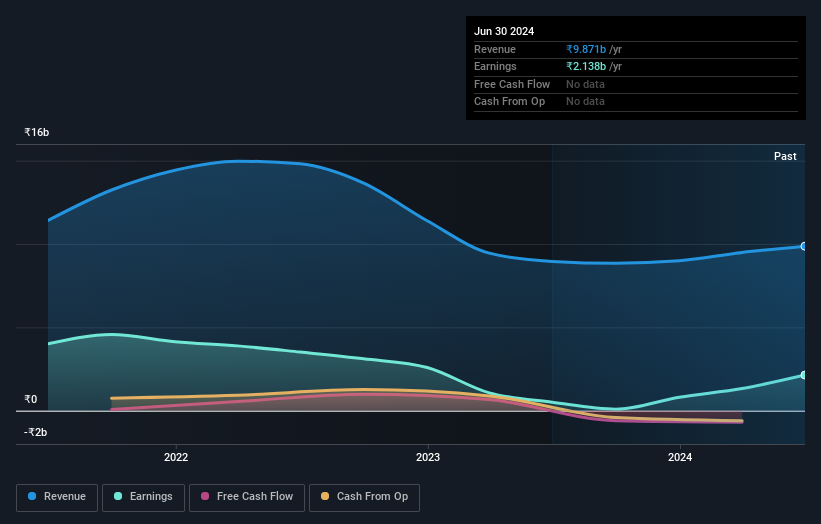Kiri Industries Limited's (NSE:KIRIINDUS) market cap touched ₹23b last week, benefiting both retail investors who own 39% as well as institutions

Key Insights
- Significant control over Kiri Industries by retail investors implies that the general public has more power to influence management and governance-related decisions
- A total of 9 investors have a majority stake in the company with 52% ownership
- 15% of Kiri Industries is held by insiders
A look at the shareholders of Kiri Industries Limited (NSE:KIRIINDUS) can tell us which group is most powerful. We can see that retail investors own the lion's share in the company with 39% ownership. That is, the group stands to benefit the most if the stock rises (or lose the most if there is a downturn).
Retail investors gained the most after market cap touched ₹23b last week, while institutions who own 23% also benefitted.
In the chart below, we zoom in on the different ownership groups of Kiri Industries.
See our latest analysis for Kiri Industries

What Does The Institutional Ownership Tell Us About Kiri Industries?
Institutional investors commonly compare their own returns to the returns of a commonly followed index. So they generally do consider buying larger companies that are included in the relevant benchmark index.
As you can see, institutional investors have a fair amount of stake in Kiri Industries. This can indicate that the company has a certain degree of credibility in the investment community. However, it is best to be wary of relying on the supposed validation that comes with institutional investors. They too, get it wrong sometimes. If multiple institutions change their view on a stock at the same time, you could see the share price drop fast. It's therefore worth looking at Kiri Industries' earnings history below. Of course, the future is what really matters.

Kiri Industries is not owned by hedge funds. Anupama Kiri is currently the company's largest shareholder with 11% of shares outstanding. Meanwhile, the second and third largest shareholders, hold 7.0% and 6.8%, of the shares outstanding, respectively. Furthermore, CEO Manishbhai Kiri is the owner of 3.4% of the company's shares.
On further inspection, we found that more than half the company's shares are owned by the top 9 shareholders, suggesting that the interests of the larger shareholders are balanced out to an extent by the smaller ones.
While it makes sense to study institutional ownership data for a company, it also makes sense to study analyst sentiments to know which way the wind is blowing. We're not picking up on any analyst coverage of the stock at the moment, so the company is unlikely to be widely held.
Insider Ownership Of Kiri Industries
The definition of company insiders can be subjective and does vary between jurisdictions. Our data reflects individual insiders, capturing board members at the very least. The company management answer to the board and the latter should represent the interests of shareholders. Notably, sometimes top-level managers are on the board themselves.
Most consider insider ownership a positive because it can indicate the board is well aligned with other shareholders. However, on some occasions too much power is concentrated within this group.
Our most recent data indicates that insiders own a reasonable proportion of Kiri Industries Limited. It has a market capitalization of just ₹23b, and insiders have ₹3.5b worth of shares in their own names. This may suggest that the founders still own a lot of shares. You can click here to see if they have been buying or selling.
General Public Ownership
The general public, who are usually individual investors, hold a 39% stake in Kiri Industries. This size of ownership, while considerable, may not be enough to change company policy if the decision is not in sync with other large shareholders.
Private Equity Ownership
With an ownership of 6.3%, private equity firms are in a position to play a role in shaping corporate strategy with a focus on value creation. Some might like this, because private equity are sometimes activists who hold management accountable. But other times, private equity is selling out, having taking the company public.
Private Company Ownership
We can see that Private Companies own 17%, of the shares on issue. Private companies may be related parties. Sometimes insiders have an interest in a public company through a holding in a private company, rather than in their own capacity as an individual. While it's hard to draw any broad stroke conclusions, it is worth noting as an area for further research.
Next Steps:
I find it very interesting to look at who exactly owns a company. But to truly gain insight, we need to consider other information, too. For instance, we've identified 1 warning sign for Kiri Industries that you should be aware of.
If you would prefer check out another company -- one with potentially superior financials -- then do not miss this free list of interesting companies, backed by strong financial data.
NB: Figures in this article are calculated using data from the last twelve months, which refer to the 12-month period ending on the last date of the month the financial statement is dated. This may not be consistent with full year annual report figures.
Valuation is complex, but we're here to simplify it.
Discover if Kiri Industries might be undervalued or overvalued with our detailed analysis, featuring fair value estimates, potential risks, dividends, insider trades, and its financial condition.
Access Free AnalysisHave feedback on this article? Concerned about the content? Get in touch with us directly. Alternatively, email editorial-team (at) simplywallst.com.
This article by Simply Wall St is general in nature. We provide commentary based on historical data and analyst forecasts only using an unbiased methodology and our articles are not intended to be financial advice. It does not constitute a recommendation to buy or sell any stock, and does not take account of your objectives, or your financial situation. We aim to bring you long-term focused analysis driven by fundamental data. Note that our analysis may not factor in the latest price-sensitive company announcements or qualitative material. Simply Wall St has no position in any stocks mentioned.
About NSEI:KIRIINDUS
Kiri Industries
Manufactures and sells dyes, dye intermediates, and basic chemicals in India and internationally.
Proven track record with mediocre balance sheet.


